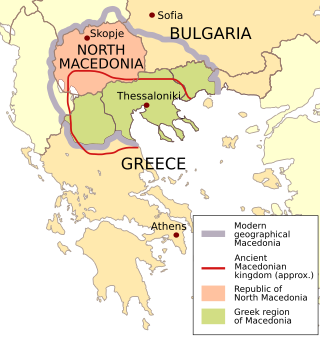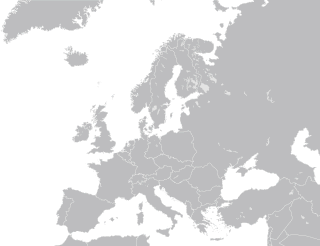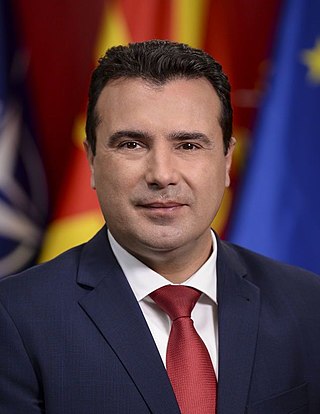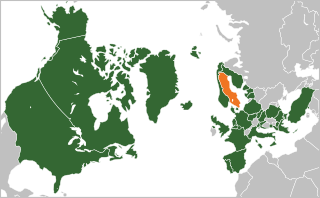As one of the oldest Euro-Atlantic member states in the region of Southeast Europe, Greece enjoys a prominent geopolitical role as a middle power, due to its political and geographical proximity to Europe, Asia, the Middle East and Africa. Its main allies are the United States, the United Kingdom, France, Italy, Cyprus and the rest of the European Union and NATO.
The history of North Macedonia encompasses the history of the territory of the modern state of North Macedonia.

The foreign relations of North Macedonia since its independence in 1991 have been characterized by the country's efforts to gain membership in international organizations such as NATO and the European Union and to gain international recognition under its previous constitutional name, overshadowed by a long-standing, dead-locked dispute with neighboring Greece. Greek objections to the country's name had led to it being admitted to the United Nations and several other international fora only under the provisional designation Former Yugoslav Republic of Macedonia until its official and erga omnes renaming to North Macedonia, a name under which it is now universally recognised.

The European Union (EU) has expanded a number of times throughout its history by way of the accession of new member states to the Union. To join the EU, a state needs to fulfil economic and political conditions called the Copenhagen criteria, which require a stable democratic government that respects the rule of law, and its corresponding freedoms and institutions. According to the Maastricht Treaty, each current member state and the European Parliament must agree to any enlargement. The process of enlargement is sometimes referred to as European integration. This term is also used to refer to the intensification of co-operation between EU member states as national governments allow for the gradual harmonisation of national laws.

The use of the country name "Macedonia" was disputed between Greece and the Republic of Macedonia between 1991 and 2019. The dispute was a source of instability in the Western Balkans for 25 years. It was resolved through negotiations between the two countries, mediated by the United Nations, resulting in the Prespa Agreement, which was signed on 17 June 2018. Pertinent to its background is an early 20th-century multifaceted dispute and armed conflict that formed part of the background to the Balkan Wars. The specific naming dispute, although an existing issue in Yugoslav–Greek relations since World War II, was reignited after the breakup of Yugoslavia and the newly-gained independence of the former Socialist Republic of Macedonia in 1991. Since then, it was an ongoing issue in bilateral and international relations until it was settled with the Prespa agreement in June 2018, the subsequent ratification by the Macedonian and Greek parliaments in late 2018 and early 2019 respectively, and the official renaming of Macedonia to North Macedonia in February 2019.

Albania is on the current agenda for future enlargement of the European Union (EU). It applied for EU membership on 28 April 2009, and has since June 2014 been an official candidate for accession. The Council of the European Union decided in March 2020 to open accession negotiations with Albania.

NATO is a military alliance of thirty-two European and North American countries that constitutes a system of collective defense. The process of joining the alliance is governed by Article 10 of the North Atlantic Treaty, which allows for the invitation of "other European States" only and by subsequent agreements. Countries wishing to join must meet certain requirements and complete a multi-step process involving political dialog and military integration. The accession process is overseen by the North Atlantic Council, NATO's governing body. NATO was formed in 1949 with twelve founding members and has added new members ten times. The first additions were Greece and Turkey in 1952. In May 1955, West Germany joined NATO, which was one of the conditions agreed to as part of the end of the country's occupation by France, the United Kingdom, and the United States, prompting the Soviet Union to form its own collective security alliance later that month. Following the end of the Franco regime, newly democratic Spain chose to join NATO in 1982.

There are nine recognised candidates for membership of the European Union: Albania, Bosnia and Herzegovina, Georgia, Moldova, Montenegro, North Macedonia, Serbia, Turkey, and Ukraine. Kosovo formally submitted its application for membership in 2022 and is considered a potential candidate by the European Union.

NATO is an international military alliance consisting of 32 member states from Europe and North America. It was established at the signing of the North Atlantic Treaty on 4 April 1949. Article 5 of the treaty states that if an armed attack occurs against one of the member states, it shall be considered an attack against all members, and other members shall assist the attacked member, with armed forces if necessary. Article 6 of the treaty limits the scope of Article 5 to the islands north of the Tropic of Cancer, the North American and European mainlands, the entirety of Turkey, and French Algeria, the last of which has been moot since July 1962. Thus, an attack on Hawaii, Puerto Rico, French Guiana, the Falkland Islands, Ceuta or Melilla, among other places, would not trigger an Article 5 response.

The accession of North Macedonia to the European Union has been on the current agenda for future enlargement of the EU since 2005, when it became an official candidate for accession. The Republic of Macedonia submitted its membership application in 2004, thirteen years after its independence from Yugoslavia. It is one of nine current EU candidate countries, together with Albania, Bosnia and Herzegovina, Georgia, Moldova, Montenegro, Serbia, Turkey and Ukraine.

The accession of Albania to NATO took place in 2009. Albania's relationship with the North Atlantic Treaty Organization (NATO) began in 1992 when it joined the North Atlantic Cooperation Council. In 1994, it entered NATO's Partnership for Peace, which began Albania's process of accession into the alliance. In 1999, the country received a Membership Action Plan (MAP). The country received an invitation to join at the 2008 Bucharest Summit and became a full member on April 1, 2009.

The accession of Montenegro to the North Atlantic Treaty Organization, or NATO, took place on 5 June 2017. In December 2009, Montenegro was granted a Membership Action Plan, the final step in an application for membership in the organization. A formal invitation was issued by the alliance on 2 December 2015, with accession negotiations concluded with the signature by the Foreign Ministers of an Accession Protocol on 19 May 2016. Montenegro officially joined NATO on 5 June 2017.

North Macedonia, officially the Republic of North Macedonia, is a landlocked country in Southeast Europe. It shares land borders with Greece to the south, Albania to the west, Bulgaria to the east, Kosovo to the northwest and Serbia to the north. It constitutes approximately the northern third of the larger geographical region of Macedonia. Skopje, the capital and largest city, is home to a quarter of the country's 1.83 million people. The majority of the residents are ethnic Macedonians, a South Slavic people. Albanians form a significant minority at around 25%, followed by Turks, Roma, Serbs, Bosniaks, Aromanians and a few other minorities.

Bulgaria–North Macedonia relations are the bilateral relations between the Republic of Bulgaria and the Republic of North Macedonia. Both countries are members of the Council of Europe, and NATO. Bulgaria is a member of the European Union. Bulgaria was the first country to recognize the independence of its neighbour in 1992. Both states signed a friendship treaty in 2017. North Macedonia has been attempting to join the EU since 2004, while EU governments officially gave their permissions to enter accession talks in March 2020. Nevertheless, North Macedonia and Bulgaria have complicated neighborly relations, thus the Bulgarian factor is known in Macedonian politics as "B-complex".

Zoran Zaev is a Macedonian economist and politician who served as prime minister of North Macedonia from May 2017 to January 2020, and again from August 2020 to January 2022.

Finland has been a member of the North Atlantic Treaty Organization (NATO) since 4 April 2023.

The Prespa Agreement, also known as the Treaty of Prespa, the Prespes deal or the Prespa accord, is an agreement reached in 2018 between Greece and the then-Republic of Macedonia, under the auspices of the United Nations, resolving a long-standing dispute between the two countries. Apart from resolving the terminological differences, the agreement also covers areas of cooperation between the two countries in order to establish a strategic partnership.

Albania–North Macedonia relations are diplomatic relations between the Republic of Albania and the Republic of North Macedonia. Both countries are full members of the Council of Europe and of the NATO. Both began European Union accession negotiations in March 2020. The Albanian language is an official language in Albania, while also being an official language in Macedonia on a municipal level, if the ethnic Albanian population exceeds 20%, and ethnic Albanians make up the second largest community in North Macedonia.

Netherlands–Sweden relations are diplomatic relations between the kingdoms of Sweden and the Netherlands. Both countries are full members of the Council of Europe, NATO and the European Union. The Netherlands has an embassy in Stockholm, while Sweden has an embassy in The Hague. the Netherlands strongly supported Sweden's NATO membership during the latter's accession process.

Sweden has been a member of the North Atlantic Treaty Organization (NATO) since 7 March 2024.

























